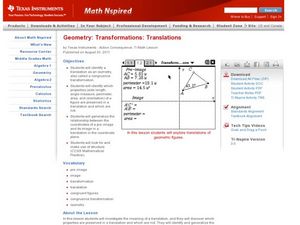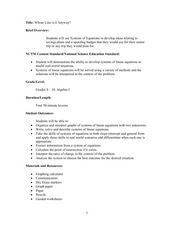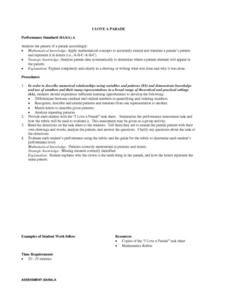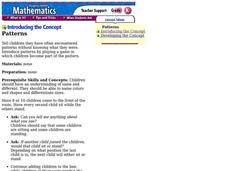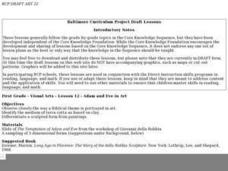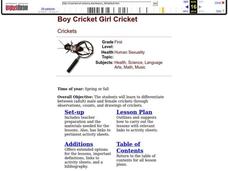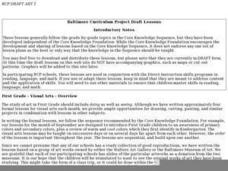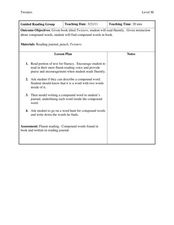Curated OER
Transformations-Translations
Young scholars perform transformations and translation on a coordinate plane. In this geometry lesson, students move shapes around on a graph identifying translation, image, and transformation. This lesson has an interactive part online...
Curated OER
Money
Students speak and listen to different prices of items and complete a worksheet. In this prices lesson plan, students circle the correct prices on a sheet they are given based on the ones their teacher calls out.
Curated OER
What is an Antiderivative? Slope Fields
Learners take the derivative of a function. In this calculus instructional activity, students define slope fields and what they are used for. They relate slope fields to the real world.
Curated OER
Whose Line is it Anyway?
Students solve systems of equations. In this algebra lesson plan, students identify the domain and range of each function. They use the slope and y-intercept to graph each line.
Curated OER
BLAST Algorithm
Students explore a series of activities on using BLAST. In this biology lesson, students explain the significance of BLAST in DNA query. They give real world applications of BLAST.
Curated OER
Cent Sense
Students identify money values. In this money lesson, students sort and group coins by value and investigate the cost of supplies needed for a snack. Students prepare snacks for a snack sale.
Curated OER
Circle Graphs
Sixth graders interpret, create, and display data in a circle graph. In this circle graph lesson plan, 6th graders use a compass, protractors, pizza boxes, and more to create a circle graph and analyze the data they put into it.
Curated OER
Calculus at the Battle of Trafalgar
Students read an article on how calculus is used in the real world. In this calculus lesson, students draw a correlation between the Battle of Trafalgar and calculus. The purpose of this article is the show everyday uses for calculus in...
Curated OER
Mass vs. Weight
Students explore physical science by conducting a measurement experiment. In this mass lesson, students identify the differences between mass and weight and define a list of other vocabulary terms. Students utilize electronic scales and...
Curated OER
Graph Of The Derivative
Students engage in a lesson that is concerned with defining and drawing the graph of a derivative. The lesson includes a definition and examples to lead them away from any misconceptions. They graph derivatives using examples that are...
Curated OER
I Love a Parade
Students receive a worksheet that describes a parade. They tell what the 10th item in the parade will be. Students draw the parade, and tell the pattern they see using letters. Students design their own parade with the same pattern. They...
Curated OER
Patterns
Students make patterns. In this early sequencing lesson, students observe and state a pattern when they see one. The teacher begins be using students to demonstrate a pattern with half of the children standing and every other child sitting.
Curated OER
Adam and Eve in Art
First graders observe closely the way a Biblical theme is portrayed in art. They identify the medium of terra cotta as based on clay. They differentiate a sculpted form from paintings.
Curated OER
Boy Cricket Girl Cricket
First graders differentiate between (adult) male and female crickets through observations, counts, and drawings of crickets.
Curated OER
A Cosmic Cafeteria
Students indentify and differentiate between transit and surface food systems. Students measure energy that is released by various foods. Students compare and contrast cooking with solar energy on earth and what they might have learned...
Curated OER
Visual Art: Primary Colors
First graders identify primary colors and consider their use in works by Henri Mattise and Mary Cassatt. They conduct an experiment with food coloring and then draw a color tree differentiating between warm and cool colors.
Curated OER
Twisters
Students differentiate between the terms 'tornado watch' and 'tornado warning' and simulate the conditions that produce tornadoes. They read "Night of the Twisters" by Ivy Ruckman and conduct an experiment using two-liter plastic...
Curated OER
Derivatives of Exponential Functions
Students take derivatives of exponential functions. In this taking derivatives of exponential functions lesson, students prove the derivative of an exponential function is the exponential function. Students find derivatives...
Curated OER
Beetle Wheels
Second graders link the development of skip-counting patterns to bars on a relationship graph. They also plot our skip-counting patterns on a hundred's board, counting by 2's and also by 4's.
Curated OER
Snakes and Scarves
Second graders explore linear patterns using snakes as the context. During the week we examine, construct and record snakes of different patterns. We also put scarves on our snakes and ask others to predict what is hidden.
Curated OER
The Wonderful World of Trees
Sixth graders identify trees by observing their structure and shape. They particiapte in taking pictures of trees with a digital camera and using these pictures in an electronic presentation where they creat a database with this...
Curated OER
Discovery
Students explore patterns in number problems. They devise a strategy to solve a number problem. Students estimate and calculate answers, making efficient use of a calculator, where appropriate, as part of solving a problem. They...
Curated OER
Scavenger Hunt
Second graders participate in a Scavenger Hunt to find out how long 1 cm is. They then find 10 objects that estimate to be 1 cm in length and record their findings on the table provided and check their estimates using a ruler.
Curated OER
How far is a km?
Students explore the size of a kilometer and the time it takes to cover this distance. They develop a concept of a km. They measure a distance of 1 km and the time taken to cover it.
